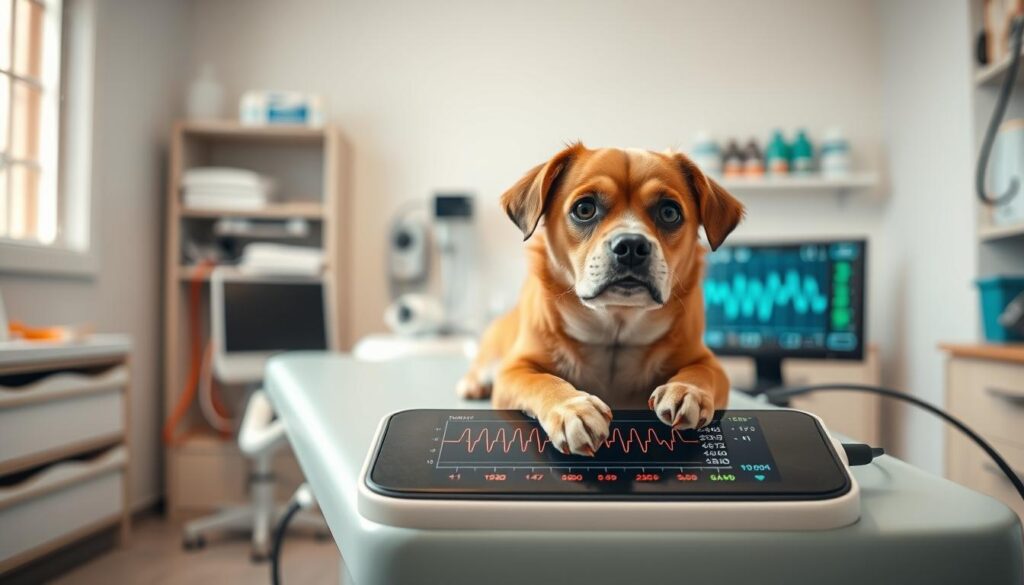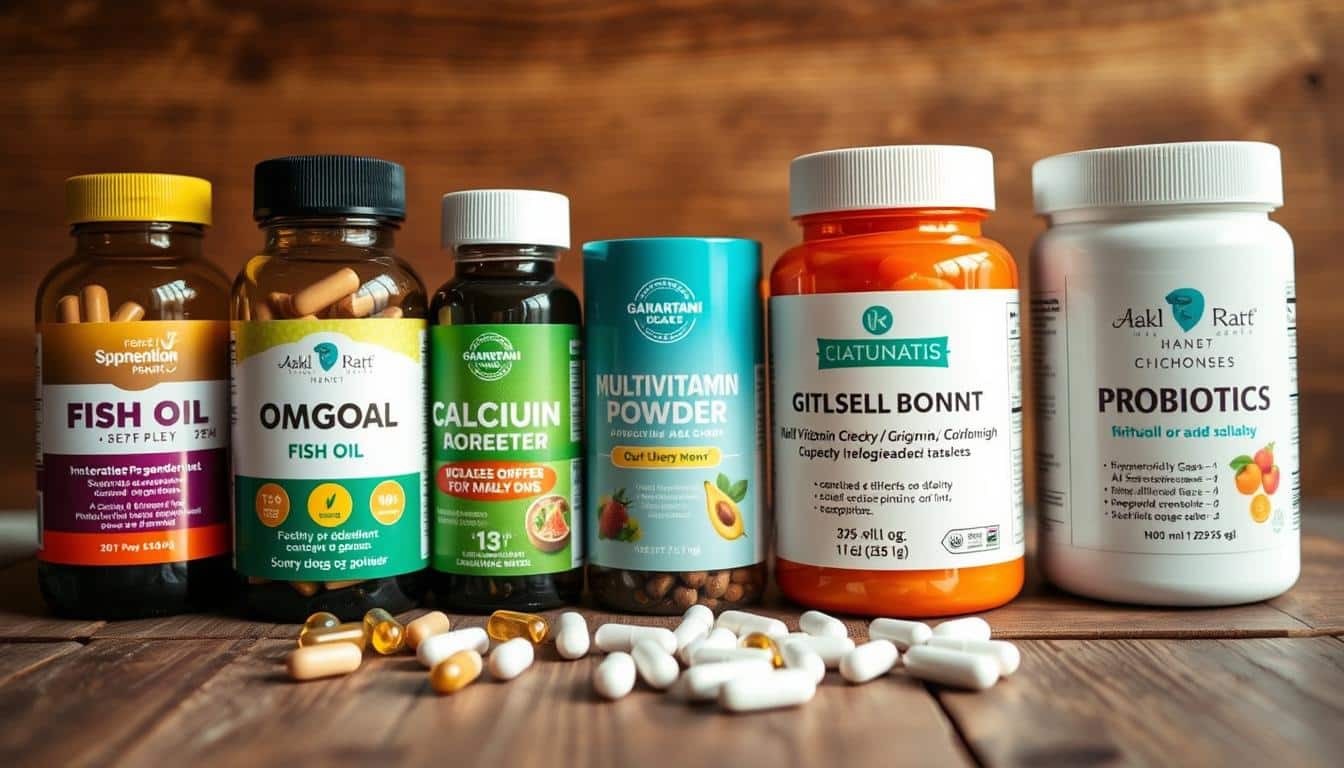A dog’s diet can really make a difference when they have heart conditions. It can slow down heart disease and make their life better. A well-chosen diet can lessen water build-up, cut down medication needs, and keep muscles strong.
Starting with low-sodium meals is a smart move for small dogs. It helps manage their heart issues better.
Experts like vets and nutritionists say to watch sodium levels and pick high-quality protein. They also suggest including omega-3 fats and making sure the diet is balanced. Popular brands like Royal Canin and Hill’s offer prescription diets. But, it’s important to talk to a specialist about homemade meals or adding supplements.
When small dogs show signs of heart trouble, diet changes can help a lot. Clinics, for example, Thomasville Veterinary Hospital, show how vets use diet along with tests and medicine to create a special heart-healthy plan for each dog.
It’s best to keep snacks and human food less than 10% of what your dog eats. Stay away from raw meat diets and pick trusted food brands. Follow the advice of the World Small Animal Veterinary Association.
If you’re unsure, always ask your vet what diet is best for dogs with heart issues. They can advise you on low-sodium dog foods that are good for your pet’s heart health.
Why a Heart-Healthy Diet Matters for Small Dogs
How a small dog eats can change how it feels and lives with heart disease. The right food can slow down symptoms and make life better. Feeding plans made just for them can mean less medicine needed, keeping pets active and comfy.
How diet affects heart function in small-breed dogs
What dogs eat can change their blood pressure, how much fluid they hold, and how much stress their heart feels. Foods that keep the right balance of electrolytes and cut down on too much sodium help stop fluid from building up. Diet and how the heart works in dogs are closely watched to tweak treatment as the disease gets worse.
Common heart conditions in small dogs that benefit from nutritional support
Myxomatous mitral valve disease is top on the list for small dog breeds like Cavalier King Charles Spaniels, Dachshunds, and Miniature Poodles. This heart issue can lead to coughing, not being able to exercise much, and not wanting to eat. Right nutrition helps control these issues and can make breathing easier by keeping fluid down.
Goals of nutritional management: maintain weight, preserve muscle, minimize fluid retention
Important goals are to keep dogs at a good weight and save muscle mass. Dogs with heart problems can lose too much weight, so they need enough protein and calories. The focus is on keeping strength without adding extra weight that makes the heart work harder.
- Maintain a slightly higher BCS if recommended by your veterinarian to prevent muscle loss.
- Monitor muscle condition score separately from fat stores and adjust protein intake as needed.
- Limit dietary sodium in line with why low-sodium diet matters small dogs to reduce fluid accumulation.
Vets use tests—like exams, bloodwork, X-rays, and heart scans—to make diet plans even better. Working with a heart doctor or a dog food expert makes sure the diet fits the dog’s health stage and overall condition.
Understanding sodium and its role in canine heart disease
Sodium affects blood volume and fluid balance in dogs. Too much sodium causes the body to hold extra water when the heart is weak. This can raise pressure in blood vessels. It may also lead to fluid buildup in the lungs, chest, or belly in pets with heart trouble.
How sodium causes fluid retention and worsens congestive heart failure
Salt draws water into the bloodstream and tissues. If a dog’s heart is weak, it can’t handle the extra fluid. This results in coughing, changes in breathing, and swelling due to increased lung or abdominal fluid.
When sodium restriction is recommended: mild heart disease versus congestive heart failure
Vets often suggest modest sodium limits for dogs with mild heart disease. For dogs showing signs of congestive failure, a stricter sodium limit is needed. The treatment plans change based on the disease stage, the dog’s blood pressure, kidney values, and medications.
Hidden sources of sodium: treats, table scraps, dental chews, supplements, and medication foods
Sodium is often hidden in items pet owners think are safe. Processed treats, deli meats, cheese, canned foods, and some dental chews can really increase sodium levels. Even rawhide and flavored pill pockets may have added salt.
- Check treat ingredients and keep treats under 10% of daily calories.
- Avoid feeding chips, salted nuts, or canned soups from the table.
- Ask your clinic about low-sodium alternatives for supplements and medication carriers.
For a low-sodium diet, read labels and choose foods recommended by vets for heart conditions. Also, make simple homemade treats without salt. Veterinary clinics and nutritionists can help find hidden sodium sources and adjust diets for dogs with CHF according to each pet’s needs.
Main keyword: Low-sodium meals for small dogs with heart issues
Choosing the right diet for a small dog with heart disease is important. Start with clear goals and advice from your vet. Depending on your dog’s heart disease stage, the low-sodium food needed can vary. Mild conditions might only need a little sodium reduction. But, pets with congestive heart failure often require strict sodium limits.
Daily sodium needs change based on your dog’s weight and health. Your vet might suggest a daily amount or a food with a specific sodium content. Since food recipes can change, always check the sodium level before switching.
Prescription cardiac diets help reduce sodium and improve heart health. They include EPA/DHA, amino acids, and antioxidants. Brands like Royal Canin Early Cardiac and Hill’s H/D often need a vet’s prescription. They aim to support the heart but also keep muscles healthy.
There are some low-sodium foods you can buy without a prescription. But, their quality and content can greatly differ. When choosing, consider both canned and dry options. And it’s best to steer clear of homemade diets unless supervised by a dog nutrition expert.
Understanding pet food labels is key to picking the right option. Look at the guaranteed analysis and ingredients to find the sodium content. To compare foods, make sure to convert their sodium levels to the same measurement.
- Find sodium expressed as % or mg/kg, then convert to mg per 100 kcal when possible.
- Check phosphorus, protein, fat, and stated EPA/DHA amounts for cardiac support.
- Confirm the manufacturer’s current label and any HeartSmart or veterinary lists you trust.
When checking sodium on pet food labels, look for clear and recent information. Consult with your vet to balance sodium intake with your dog’s overall health needs.
Key nutrients to prioritize in heart-supporting meals
Choosing the right nutrients for your dog’s heart is vital. It can slow muscle loss, boost blood flow, and keep their appetite healthy. Make sure the food’s quality is high and fits your dog’s specific health stage. Always team up with your vet to adjust the diet and check how well it works.
Protein and muscle maintenance: avoiding low-protein pitfalls
Protein is crucial for dogs with heart issues. It should stay normal or even higher unless kidney disease is severe. Diets low in protein can lead to muscle loss and slow recovery. Try to include high-quality proteins like chicken, lean beef, eggs, or cottage cheese. Some specialized diets are designed just for heart conditions.
Omega-3 fatty acids (EPA/DHA) for inflammation and cachexia support
Supplements like fish oil that are rich in Omega-3 (EPA/DHA) can cut down on inflammation. They may also prevent weight loss and irregular heartbeats. Dosage usually depends on the dog’s weight. Talk about any bleeding risks and pick products tested for purity by groups like USP or NSF.
Potassium and magnesium monitoring when dogs are on diuretics
Diuretics can lower the levels of important minerals like potassium and magnesium. This can affect your dog’s appetite and muscles. It’s key to have regular blood tests to catch any problems early. If levels drop, your vet will guide you on diet changes or supplements, avoiding home remedies.
Taurine and L-carnitine considerations for breed-specific risks and DCM
In certain dog breeds, taurine, and L-carnitine play crucial roles. Blood tests for taurine are needed if there’s a risk of heart issues. L-carnitine’s rarely lacking but matters in Boxers and active dogs. Supplements should come from trusted sources and be vet-approved.
Antioxidants and CoQ10: potential benefits and veterinary oversight
Supplements like CoQ10 and antioxidants might help with energy and stress at the cellular level. But, evidence in dogs is still limited. So, vet advice is key. Choose supplements that are clear about how they’re made, with USP certification being preferable to avoid quality issues.
For top results, focus on high-quality proteins and the right dose of Omega-3 supplements. Keep an eye on electrolytes and choose supplements wisely. Working closely with your vet ensures the best diet plan for your dog’s heart.
Designing balanced homemade low-sodium meals for small dogs
Making low-sodium meals for small dogs with heart disease needs careful thought and teamwork. You need to start with a plan. This plan should aim to help the dog’s heart, keep its muscles strong, and control its calories. Getting help from a nutrition expert is key to avoid mistakes.
Why work with a board-certified veterinary nutritionist
A vet nutritionist checks the dog’s medical history, lab tests, and meds before making a recipe. Diets made at home without a nutritionist’s advice often lack essential nutrients or have too much of certain minerals. Working with a nutritionist lowers the risk of problems related to electrolytes, kidney stress, and heart issues.
Safe protein, carbohydrate, and fat sources for small breeds with heart disease
- Proteins: lean cooked chicken, turkey, and low-mercury fish like salmon provide safe proteins for heart dogs while supporting muscle maintenance.
- Carbohydrates: white or brown rice and cooked sweet potato offer digestible energy without added sodium.
- Fats: small amounts of olive oil or controlled fish oil supply EPA/DHA once approved by the clinician.
- Treats: prepare unsalted homemade treats and limit treats to under 10% of daily calories.
How to avoid nutrient excesses and deficiencies in homemade recipes
Always use recipes from a vet nutritionist and get the nutrients checked often. Keep an eye on electrolytes, kidney function, and muscle health with regular vet visits. Stay away from raw diets, which can risk bacterial infection and nutritional shortages for heart-failure dogs.
Portion control, caloric density, and feeding frequency to maintain ideal body condition
Be exact in measuring food and controlling portions for dogs with CHF. Offer small meals often to help with appetite issues while keeping weight steady. If appetite drops, ask your vet about energy-rich, low-sodium foods that prevent muscle loss and maintain fluid balance.
Choosing commercial foods and brands for cardiac support
Picking a vet-recommended diet is key for managing heart disease in small dogs. Trusted brands create special formulas. They keep sodium low and ensure the right nutrients, like EPA/DHA and balanced protein, are present. Always check the latest product info as recipes and nutrients may change.
When looking at prescription diets, focus on their features over their marketing. Royal Canin Early Cardiac has detailed sodium info and includes omega-3s for fighting inflammation. Hill’s H/D offers support for the heart, liver, and kidney with a special electrolyte balance. Purina CC CardioCare boosts protein and uses a special amino acid mix to keep muscles strong.
- Ask your vet for the most recent nutritional details direct from the maker.
- Make sure the food still meets your pup’s needs for sodium and calories.
- Talk about the cost and how to get these special diet foods, as they may be pricier and need a vet’s approval.
Taste matters a lot for dogs who aren’t eager to eat. Canned foods are usually more appetizing and have more water, great for dogs who aren’t drinking much. Dry kibble might be better for teeth and more convenient, but sodium and nutrients can vary between wet and dry foods, even from the same brand.
Comparing wet vs dry heart-friendly dog foods means checking labels closely. Look at sodium, protein, fat, and omega-3 levels for each calorie. Since different flavors might have different sodium levels, don’t think all options are the same.
- Double-check the latest nutritional info with the food manufacturer.
- Get your vet clinic to ask for the newest nutritional data if it’s needed.
- Keep an eye on your dog’s weight, eating habits, and electrolytes with any food switch.
Vet offices and heart specialists can confirm how trustworthy brands are and explain the nutrient details of Royal Canin Early Cardiac, Hill’s H/D, and Purina CC CardioCare. They’ll help you choose the best heart-care food for your small dog that meets both medical and taste needs.
Treats, supplements, and medication delivery with low-sodium priorities
Choosing the right treats, supplements, and pill-giving methods can really help control a dog’s sodium intake. It’s vital to pick low-sodium options to keep their heart working well and support their health.
Keep treats and table scraps below 10% of daily calorie intake. Go for plain foods like cooked chicken, steamed green beans, or carefully chosen low-sodium snacks. Be aware that rawhides and dental chews often have hidden salt, so read labels and follow your vet’s recommendations.
- Seek out single-ingredient freeze-dried meats that show sodium content.
- Make sure treats don’t exceed the 10% recommended limit.
- Steer clear of processed meats, cheese, and people food for pill-giving.
Your vet should approve all supplements. Fish oil can be good for dogs with heart issues, helping with inflammation and muscle loss. However, discuss proper amounts and risks with your vet. Taurine can be crucial for certain dogs at risk of heart disease. Always test for taurine levels and talk to a cardiologist before adding it.
- Opt for well-known brands that undergo third-party testing.
- Look at human supplements that meet USP standards for consistency and safety.
- Avoid mixed products that don’t clearly state their quality.
If your dog is on diuretics, monitor their potassium and magnesium with your vet. They might need supplements based on blood test results. Always consult your vet before starting any electrolyte products.
Pills need to be given with low-sodium foods. Avoid using high-salt items like cured meats or cheese. Opt for plain chicken or specific low-sodium pill treats approved by your vet. This ensures safe medication administration without extra sodium.
- Check for sodium in any treat or pill pocket you use.
- Request easy-to-follow low-sodium treat guides from your vet that suit small dogs.
- Keep detailed records of all treats and supplements to help your vet understand your dog’s sodium and nutrient intake.
Making smart choices with low-sodium dog treats, fish oil, medication practices, and taurine supplements helps manage sodium intake. This supports heart health treatment plans. It’s important to work closely with your vet or a pet nutrition specialist for advice tailored to your dog.
Managing appetite, weight, and muscle loss in small dogs with heart disease
Heart failure often leads to dogs wanting to eat less. Owners quickly notice when their dog starts to lose interest in food after being diagnosed. This could be because they’re just not hungry, are picky, or won’t eat at all. It’s key to get a vet’s input if your dog suddenly eats less, to see if meds or worsening heart issues are to blame.
It’s important to catch changes early to protect your dog’s health. Keep an eye on their weight each week. Share your findings with your vet, so they can help decide what to do next.
Signs to watch for:
- Less interest in eating, even missing meals for days.
- Changing what they like to eat in taste, warmth, or kind of food.
- Obvious muscle loss around their back, shoulders, and back legs.
Some simple feeding tricks can help a lot. Giving small meals often can boost how much they eat. Heating up special heart-friendly canned food makes it smell and taste better. You could also try changing from dry to wet food or add a vet-approved, low-salt flavor enhancer.
If these tips don’t work, talk to your vet about more options. Dogs with heart problems sometimes need special diets. These diets are rich in protein and calories but don’t cause fluid build-up.
Tools like scales and scores help keep track of your dog’s condition. Grade your dog’s body condition and muscle with specific scales. Aim for a healthy weight, advised by your vet, for dogs with heart issues. This helps spot muscle loss before it gets too serious.
Your vet’s team is there to guide you. They might adjust your dog’s meals, have you come in for weigh-ins, or even suggest seeing a nutrition expert. If your dog keeps eating poorly, they might need special help at the clinic.
Always keep in touch with your vet. Regular updates on your dog’s weight and eating habits help the vet offer the best care. This way, your dog can stay strong and comfy despite their heart disease.
Monitoring, veterinary collaboration, and red flags
Regular check-ups keep dogs with heart conditions stable and comfy. At home, monitor their weight, condition, and muscle scoring. Note their eating habits, any cough, how hard they breathe, and changes in how active they are. This helps your vet catch issues early.

Essential tests to track
- Regular bloodwork: electrolytes such as potassium and magnesium matter when dogs take diuretics or ACE inhibitors. Watch for hyperkalemia or hypokalemia.
- Renal values: BUN and creatinine affect medication choices and diet adjustments.
- Weight and fluid checks: sudden gains often reflect fluid retention rather than fat.
- Imaging and cardiac tests when recommended: chest radiographs and echocardiography assess heart size and function.
When to change diet versus adjust medication
- Red flags heart disease dogs owners should report: increased coughing, worse breathing, abdominal swelling from ascites, peripheral edema, rapid weight gain, loss of appetite, or fainting.
- Diet changes may help with fluid balance and electrolytes, but drug dosing may need revision if signs point to worsening heart failure.
- Discuss timing: ask your veterinarian whether to alter sodium intake, add supplements, or modify diuretics. Self-prescribing supplements can create harmful interactions.
Coordinating care
- The primary care veterinarian manages routine monitoring, medications, and urgent exams.
- A veterinary cardiologist provides advanced diagnostics and targeted cardiac therapies when tests show progression.
- A board-certified veterinary nutritionist designs balanced, safe feeding plans and home-cooked recipes that respect drug interactions.
- Clear communication among these professionals ensures prompt action on monitor dog CHF electrolytes and questions about when to change dog diet CHF, reflecting veterinary cardiologist nutritionist roles in each case.
Conclusion
A healthy diet for your heart-strong dog focuses on special nutrition and vet care. Choose low-sodium meals to prevent fluid buildup in small dogs. Be sure to include enough protein, EPA/DHA, and the right electrolytes to keep muscles strong and energy high. Using vet-recommended diets like those from Royal Canin, Hill’s, or Purina makes these choices easier when you work with a vet or a dog nutrition expert.
Keep a close eye on your small dog’s eating habits, weight, and general health. Regular check-ups to monitor health markers are essential. If your dog eats less or shows signs of fluid buildup, get in touch with your vet or a heart specialist for dogs right away to change the diet or medicines.
It’s best to avoid raw or homemade meals unless they’re made by an expert. Keep snacks to less than 10% of your dog’s daily food intake. By sticking to these guidelines and working with your vet, you can help your small dog stay strong and happy, even with heart disease.
FAQ
Why does my small dog need a heart-healthy, low-sodium diet?
How does sodium worsen congestive heart failure (CHF)?
What are common hidden sources of sodium I should watch for?
How do I define “low-sodium” for a small dog and who sets the target?
Are prescription cardiac diets better than over-the-counter low-sodium foods?
How can I read a pet food label to compare sodium and other cardiac nutrients?
Should I restrict protein in my dog with heart disease?
Are omega-3 fatty acids and supplements helpful for heart disease?
Can diet-associated dilated cardiomyopathy (DCM) be reversed by diet changes?
Is it safe to feed home-prepared or raw diets to a dog with heart disease?
What safe ingredient options work for homemade low-sodium meals?
How do I keep my dog’s treats low-sodium and within calorie limits?
How should I give medications without adding extra sodium?
What feeding strategies help a dog with reduced appetite or picky eating?
How do I monitor weight and muscle condition at home?
Which tests should be done routinely for a dog on a cardiac diet or heart meds?
When should diet be changed versus when should medications be adjusted?
How do I choose a trustworthy commercial cardiac food brand?
Who should be involved in my dog’s cardiac nutrition care team?
What are red flags that require immediate veterinary attention?
Content created with the help of Artificial Intelligence.



